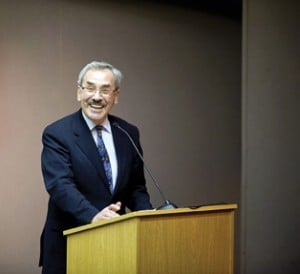 Kenneth Keller, MSE ’63, PhD ’64, has pursued an international career across many boundaries, and not just the kind with customs officials. From the start, his wide interests and capabilities in science and technology led him from the liberal arts to a PhD in chemical engineering, and then university leadership and foreign affairs.
Kenneth Keller, MSE ’63, PhD ’64, has pursued an international career across many boundaries, and not just the kind with customs officials. From the start, his wide interests and capabilities in science and technology led him from the liberal arts to a PhD in chemical engineering, and then university leadership and foreign affairs.
Today, as director of the Bologna Center in Italy, part of Hopkins’ Nitze School of Advanced International Studies (SAIS), and a professor of science and technology policy, Keller sees that his own story is not such an anomaly.
“Most of our students, who are typically in their first year of a two-year master’s program, come from a background in social sciences, but we’re seeing more coming from engineering,” says Keller. He estimates that about 10 percent of students at the Bologna Center start in engineering, and find that what led them to engineering-the desire to do something that has a positive impact on society-leads them on to international affairs, he says, “because that’s the link through which technology enters society.”
In the course he teaches on technology and international affairs, says Keller, “the intersection between science, technology, and international issues comes up again and again.” For example, how does an international consensus come about on the question of climate change? “On one hand, it’s a scientific question,” he observes, “but it’s also a question of political process.
“The application of anything we develop in technology is mediated by public policy,” says Keller.
Keller has been at the forefront of these issues in practice as well as in academia. At the University of Minnesota, a public research university now with more than 51,000 students in 143 degree programs, Keller served first as provost and vice president of academic affairs (1980-1985) and then as president (1985-1988), “roles in which I was helped by the fact that engineers were used to dealing with complex problems,” he says.
In 1990, he was asked by the Council on Foreign Relations to look at the intersection of science, technology, and foreign relations. He recalls, “It seemed a natural transition.” He served the council for six years as senior fellow for science and technology and senior vice president of programs.
In the 1990s, Keller also served as a science and technology advisor to the director of the CIA. (“We didn’t do much in the operational area-the spies. That wasn’t our thing.”) Then came a year as a visiting scholar at the Bologna Center. He and his wife fell in love with the place.
As part of the SAIS master’s program, the Bologna Center prepares about 190 students a year for careers in international affairs, with an emphasis on economics, international development, geographic area studies, and languages.
Since Keller became the center’s director in fall 2006, he has worked to strengthen its role as a center of study for sustained and in-depth explorations. He points to last year’s 11-lecture series on Islam and Europe as just one example. The center has also been open to collaborations with other institutions. It recently worked with the Foundation for Worldwide Cooperation, established by former Italian Prime Minister Romano Prodi, to organize a May 2010 international conference on Africa. In preparation for the conference, 20 Bologna Center students prepared background papers exploring the continent from different perspectives.
This spring, Keller is visiting Baltimore with plans to meet with department heads at Hopkins’ schools of Arts and Sciences and Engineering to explore new collaborations. “One of the nice things about the Hopkins engineering school is that it’s small and quick on its feet,” says Keller, allowing it to respond nimbly to opportunities that arise.
Keller wants his faculty at the Bologna Center to have the kind of stimulation he’s enjoyed in his career. “One of my goals is that we keep the very, very strong and productive people here,” he says, and actively engaged in work that crosses conventional lines and disciplines.




